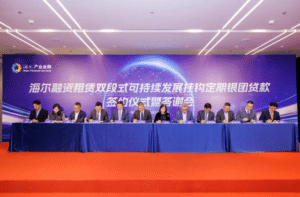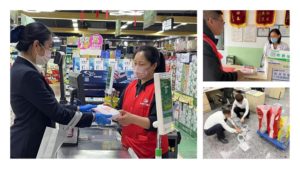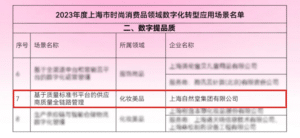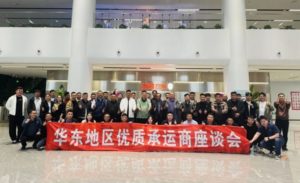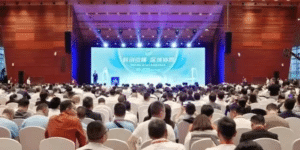TSMC sets up factory in Japan to promote “Taiwan-Japan comradeship” and strengthen economic security
[ad_1]
TSMC Chairman Liu Deyin told Japanese Prime Minister Fumio Kishida on February 26 that he would work with the Japanese government to build a semiconductor supply chain on Kyushu Island. Experts said that semiconductors are the main economic axis of the “Taiwan-Japan Comrades”, and TSMC’s establishment of a factory in Japan is a “chain strength” to ensure economic security.
Semiconductor cooperation makes Taiwan and Japan a comradely nation
TSMC’s Japan Kumamoto wafer fab JASM held an opening ceremony on February 24 and will be put into production by the end of this year. At the opening ceremony, the Japanese government announced that it would provide another approximately US$4.86 billion in subsidies to TSMC to assist it in building a second factory. Construction of the second wafer fab will begin at the end of this year and will be put into production in 2027.
Kishida Fumio said in a video speech that the logic semiconductors produced by TSMC in Kumamoto are an important step for the semiconductor industries of Taiwan and Japan and semiconductor customer-related industries. In this regard, TSMC founder Zhang Zhongmou said that TSMC’s new factory in Japan will improve the resilience of Japan and the global chip supply chain. He believes that this will be the beginning of the revival of the semiconductor manufacturing industry in Japan.
Li Shihui, chairman of the Japan Research Institute in Taiwan, said in an interview with Voice of America that in the past 30 years, under the trend of globalization, the semiconductor supply chain has gradually developed into a professional division of labor production model. TSMC, UMC) and professional semiconductor packaging and testing (such as ASE) rank first in the world; while Japan is a leader in semiconductor equipment and key materials. He said that since the US-China trade conflict in 2018, the strengthening of the semiconductor supply chain has become the core of the economic security of various countries.
Li Shihui said: “In the past, the ‘specialized division of labor under globalization’ developed by the semiconductor supply chain has rapidly evolved into ‘independent production under hemisphericization.’ When international semiconductor materials and chips undergo drastic changes, the semiconductor supply chain between Taiwan and Japan Industrial chains can directly support each other and respond to changes in the international political and economic situation.”
He pointed out that for Japan, with automobile manufacturing as its core industry, the issue of autonomy in the semiconductor supply chain has affected 5.5 million automobile industry-related employment opportunities in Japan.
Cai Xixiang, a professor in Tamkang University’s master’s degree program in political and economic studies, said that TSMC’s Kumamoto plant has indeed promoted the prosperity of the Japanese automobile industry, and Taiwan also believes that this is a new milestone for Taiwan-Japan joint cooperation to gain greater international advantages in the reorganization of the global supply chain. .
He told Voice of America: “Taiwan and Japan have formed a close relationship as the ‘Taiwan-Japan Comrades’, and semiconductors are the main economic axis of the ‘Taiwan-Japan Comrades’. TSMC has set up factories in Japan to form the ‘Taiwan-Japan Semiconductor Alliance’. This is not only a new starting point for the joint economic security of Taiwan and Japan, but also a shot in the arm to strengthen the resilience of the global supply chain and get rid of China’s economic pressure.”
Former Japanese Representative Nobuyuki Fukushima believes that whether TSMC is established in Western democratic countries such as Japan, Taiwan, South Korea, and the United States, rather than in China, it will indeed have an impact on the international political and economic situation, and this is The consistent direction of the Indo-Pacific strategy.
He told VOA: “TSMC’s establishment of a factory in Japan will not cause a major change in the direction of the supply chain in the Indo-Pacific region. It will just continue the direction from before to now.”
Fukushima Shinyuki believes that the semiconductor technology of democratic partners such as Japan, Taiwan, the United States and South Korea has advanced rapidly. In addition to inviting other countries to set up factories, Japan should also set up research units to train more talents to engage in semiconductor research and development, marketization and manufacturing. For Economic security can only have integrated planning in the supply chain.
Strengthen economic security with “chain strength”
On the other hand, the Japanese government finalized a new bill at a cabinet meeting on February 27, the “Act on the Protection and Utilization of Important Economic Security Information,” aimed at strengthening the management of confidential economic security information. The content focuses on the international joint development of companies related to related technologies.
Former Japanese Congressman Nobuyuki Fukushima believes that for Japan, TSMC’s establishment of a factory in Kumamoto is of great significance to improving economic security in terms of supply chain.
He said: “In the past few decades, Japan has been in a state of extreme shortage of semiconductors, which has seriously affected the production of automobiles. And Japan’s manufacturing of automotive semiconductors is sluggish. We must consider that if the situation in East Asia becomes more tense, semiconductors may There are supply chain problems that make it impossible to respond.”
Cai Xixi, a professor in Tamkang University’s master’s degree program in political and economic studies, pointed out that the new version of Japan’s National Security Strategy states that Japan’s comprehensive national strength for security includes five major elements: diplomatic strength, defense strength, economic strength, technological strength, and intelligence strength. Diplomatic strength It is the “surface competitiveness” that is easily visible to the eye; defensive strength is the real competitiveness and the “deep competitiveness” that is not easily visible to the eye; and economic strength is a sustainable source of financial resources. He said that modern warfare is no longer limited to weapons, and the “Taiwan-Japan Semiconductor Alliance” is a new artifact for economic security in the face of Chinese pressure.
Cai Xixiang said: “Strategic investment in semiconductors also strengthens the restraint force. In this regard, Taiwan and Japan have a clear complementary relationship. Taiwan is good at manufacturing and responding to the market quickly, while Japan is good at materials and equipment.”
Li Shihui, chairman of the Japan Research Institute in Taiwan, pointed out that the Japanese government formulated the “Semiconductor Strategy” in June 2021. The directions it promotes include the semiconductor industry asset portfolio and supply chain resilience. Japan funded the two semiconductor plants built by TSMC in Kumamoto. The foundry is the most important specific policy in Japan’s semiconductor strategy; this development shows that Taiwan’s semiconductor manufacturing process and high-tech product manufacturing capabilities have become an indispensable partner for Japan when thinking about economic security.
Li Shihui said: “Taiwan and Japan’s close cooperation in the semiconductor supply chain presents a major international political and economic situation since the 2020s, that is, the arrival of the ‘chain power’ era, which refers to geopolitical, economic and The links in the industrial supply chain, the strength of a specific country in the international community. Irreplaceability in the global economic industry is the core of modern chain strength.”
Li Shihui believes that through cooperation with TSMC, Japan has gradually strengthened its irreplaceability in the supply chain and used its chain strength to implement economic security, which will also cause pressure on China.
China will consider how to deal with it
Chinese media such as “Jiweiwang” reported that industry insiders analyzed that TSMC is gradually taking shape to build another foundry ecological chain outside China. Japan, relying on TSMC’s technical strength, is gradually catching up in advanced manufacturing processes, which may cause China to lose ground in semiconductors. All manufacturing advantages are lost.
Former Japanese congressman Nobuyuki Fukushima said that TSMC’s continuous establishment of two wafer fabs in Japan will definitely have a considerable impact on China.
He said: “Japan’s strength is the equipment and materials needed to manufacture semiconductors. This is already included in the economic security mechanism led by the United States. It will indeed have a certain impact on China. Perhaps China will now start to think about the United States and Japan. and other countries’ response plans for comprehensive decoupling in the supply chain.”
Cai Xixiang, a professor in Tamkang University’s master’s degree program in political and economic studies, believes that compared with the Taiwan-Japan semiconductor cooperation relationship, which was originally friendly and relied on each other’s strengths, China’s semiconductor industry has been restricted. Under the confrontation between the United States and China, there are no products from democratic countries. technical support. He pointed out that the Chinese government attaches great importance to security and is committed to strengthening support policies, promoting cooperation among domestic enterprises, and building domestic supply chains, which has indeed reduced overseas dependence a bit, but there is still a big gap with the world’s most advanced countries.
He said: “Since the United States and Japan restrict the export of advanced manufacturing equipment to China, China must use lower-end manufacturing equipment to catch up with advanced processes. The research and development and production of advanced manufacturing equipment should be a part that China will continue to strengthen.”
Li Shihui, chairman of the Japan Research Institute in Taiwan, believes that as China gradually establishes its dominant position in the global supply chain, the semiconductor industry has become a geopolitical and geoeconomic battleground between the United States and China.
He said: “In terms of existing advanced manufacturing processes, China will invest state capital in subsidies when it has no advantages in yield and cost. Taking Huawei’s 5G chip production as an example, it has received more than US$30 billion in subsidies from the Chinese government. .”
Li Shihui said that China may also put pressure on Japan and Taiwan through key materials. For example, it has already imposed export controls on gallium and germanium. In the future, it may also restrict the extraction of hydrofluoric acid from fluorite for wafer cleaning and use it through various Taiwan and Japan must be careful to guard against any legal or illegal methods of obtaining semiconductor-related technology.
[ad_2]
Source link


